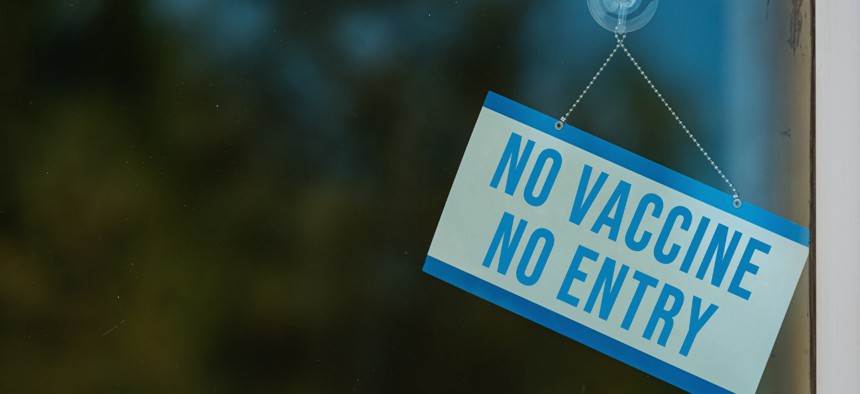
shauni / istock
Coronavirus Roundup: Lessons From COVID on Data Infrastructure; Implications of the OSHA Vaccine Rule
Here’s today’s list of news updates and stories you may have missed.
During remarks in Chicago on Thursday, President Biden outlined the steps his administration has taken since January to procure enough vaccines for Americans and encourage people to get them. “But even after all those efforts, we still had more than a quarter of people in the United States who were eligible for vaccinations but didn't get the shot,” said the president. “While I didn’t race to [impose vaccine mandates] right away, that’s why I’ve had to move toward requirements … That wasn't my first instinct.” Last month, Biden announced the vaccine mandate for federal employees and contractors, as well as the Labor Department emergency rule that requires employers with 100 or more employees to mandate vaccines. Biden added that “These requirements are already proving that they work.”
Here are some of the other recent headlines you might have missed:
Politico created a visualization of who exactly will be covered by the Labor Department vaccine rule, which requires businesses with 100 or more employees to attest to being vaccinated or submit to frequent virus testing. “The 2020 release published data, as of 2018, and showed two-thirds of U.S. workers are at firms with 100 or more employees,” said the report. Also, “even though the standard takes effect immediately, that doesn’t mean it will affect all states at the same time,” the report continued. “Twenty-four states, along with Washington, D.C., and two territories are federal OSHA states—so the standard will affect them as soon as it’s in place. Twenty-six states and two territories have OSHA-approved state plans, which give them 30 days after the OSHA rules to implement their own standards. Those standards have to be at least as protective as OSHA’s, so they would not be able to weaken the federal rule on their own.”
The General Services Administration is hosting an industry webinar on October 13 to discuss implementation of the contractor vaccine mandate. More background information can be viewed here.
Biden is close to picking a nominee for Food and Drug Administration commissioner, Politico reported on Wednesday. “The White House was nearing a final pick anyway, but National Institutes of Health Director Francis Collins' Tuesday announcement that he would step down accelerated the timeline, according to one person with knowledge of the matter,” said the report. “‘They were ready to go anyway, but Collins' announcement pushed them over the edge. It sounds like it's a consensus, they think it's a pretty uncontroversial choice,’ the person said.”
Pfizer and BioNTech announced on Thursday they officially applied for emergency use authorization for their vaccines for kids ages 5-11. “With new cases in children in the U.S. continuing to be at a high level, this submission is an important step in our ongoing effort against #COVID19,” said Pfizer in a tweet.
A man from Massachusetts became the first person in the country to be charged for fraudulently seeking pandemic small business relief loans, the U.S. Attorney’s Office for the District of Rhode Island announced on Thursday. David Adler Staveley “who faked suicide shortly after his arrest resulting in a nationwide search for him by the U.S. Marshals Service, was sentenced [Thursday] to 56 months in federal prison,” said the office.
Tribal groups that represent Native Alaskans are rushing to spend billions of dollars in pandemic relief that expires in December as they only recently started receiving money from the CARES Act that was enacted in March 2020, The Hill reported on Wednesday. “The $2 trillion package allocated $8 billion to federally recognized tribal governments, of which about $500 million was earmarked for Alaska Native Corporations. But three Native American tribal governments in the lower 48 states sued, arguing that the Alaska Native Corporations were not formally recognized by the federal government and therefore should be ineligible for the funds,” said the report. “The Supreme Court ruled in June that the corporations were eligible for the funds.”
The nonprofit Partnership for Public Service released a report on Wednesday about lessons learned during the pandemic that can help the government improve its public health data infrastructure. For example, “a skilled workforce is critical to managing and implementing a strong data infrastructure as well as ensuring the data itself is sound enough to use and analyze,” said the report. “With high turnover, burnout and limited capacity, federal public health teams worked quickly to deploy, recruit, restructure and transition their workforces during COVID-19. Some of this included conducting remote training, partnering with universities to attract short-term talent or standing up temporary offices and positions to address data needs.” Therefore, agencies should continue to review the lessons they learned from the pandemic response to “determine what may be replicable and scalable” as well as “continue to invest in and retain skilled employees who can work with data and advanced technologies.”
Upcoming: White House Press Secretary Jen Psaki will give a briefing at 2:30 p.m.
Help us understand the situation better. Are you a federal employee, contractor or military member with information, concerns, etc. about how your agency is handling the coronavirus? Email us at newstips@govexec.com.







